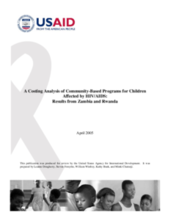In sub-Saharan Africa an estimated 12 million children under the age of 18 have lost one or both parents to AIDS (UNAIDS, UNICEF, USAID, 2004). Many more children live with one or more chronically ill parent. At present, however, relatively few orphans and children with chronically ill caregivers are receiving services. Estimating the costs associated with delivering services to orphans and children with chronically ill caregivers can provide policymakers and program managers with important information necessary for the successful management and sustainability of a program. This paper analyzes the programmatic costs of two community-based programs for children affected by HIV/AIDS in Rwanda and Zambia in order to provide information on the current costs of the two programs. The paper also discusses additional costs related to scaling up the existing programs and outlines issues relating to long-term sustainability of programs for children affected by HIV/AIDS.
This paper analyzes costs from CARE Rwanda’s and Bwafwano Zambia’s programs for children affected by HIV/AIDS. CARE International operates an established program for children affected by HIV/AIDS in Gitarama Province, Rwanda. The program provides peer education and counseling, life skills training, psychosocial support, and food and nutrition support to more than 3,000 orphans and children with chronically ill caregivers. The Zambian organization, Bwafwano Community Home-Based Care Organization (Bwafwano Zambia), operates in the Chipata catchment area of Lusaka. Bwafwano Zambia provides a comprehensive set of services, including home-based care (HBC), a community health clinic, a community school, support for students to attend government schools, a feeding program, a sexual and reproductive health education program, and income-generating activities (IGA). Bwafwano Zambia currently serves approximately 2,000 orphans and children with chronically ill caregivers.
©USAID

